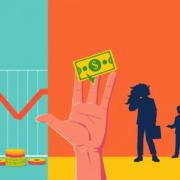Navigating Adversity: The Struggles of Recent College Grads in a Tough Job Market
The Job Market Slowdown Is Hitting Recent College Graduates Hard
Today young college graduates face a slow job market. A degree does not open a clear path to work. The U.S. market now shows real strains that shape early careers.
A Tough Landscape for New Graduates
Christina Salvadore, 23, holds a degree from Georgetown University. She has done several internships. She planned to start a job in New York City in the fashion or beauty field. Yet, she now finds it hard to land a full-time job. She sent many applications and went to several network meetings since last spring.
"I spend my days on LinkedIn at my parents’ house," Christina said to a news channel. With few full-time roles, she picks part-time work to pay bills. This is not the bold start many had once seen.
Her story joins reports of more young graduates without work. New federal figures show that new college grads face high jobless numbers and problems getting white-collar work. This change also shifts how first-time job seekers find work.
Statistical Evidence of a Decline
Recent federal data now shows that the rate for "new entrants" in full-time work is at its top for nine years in 2025. The share of jobless new grads is at its highest in decades. A leading labor research group, Burning Glass Institute, now calls the U.S. a "no country for young grads." The team led by chief economist Gad Levanon released a report this summer. He points out that a bachelor’s degree no longer brings the white-collar career one expects. Levanon notes that, for the first time in modern times, a four-year degree does not keep its promise for many young people.
Young people with bachelor’s degrees have usually had lower jobless rates than others with only a high school diploma. Now, the difference is very small—its narrowest gap since the early 2000s.
The Emotional Toll and Social Media Reflections
The search for full-time work now affects the minds of new grads. Many feel stress and worry. On social media sites like TikTok, young adults share their job hunt stories. These posts speak about slow progress, unanswered applications, and other problems. Many note that entry jobs now ask for years of experience. Some also say that they have had to move back with their parents.
The feelings run deep. Many say they feel like they are “crashing out” as doubt fills their minds. Michael Hartman, a Boston College graduate with an economics degree, has looked for work for nearly a year without success. He even asked advice from a psychic, showing how lost some feel.
Economic Policymakers Take Notice
Top economic leaders now see this slow hiring landscape. Jerome Powell, the Federal Reserve Chair, has noted that young workers now face a tougher search for jobs. He points to a time when few people are fired and few are hired. Data from August shows that hiring has slowed and fewer people change jobs. A 25% jump in those unemployed for 27 weeks or more warns of a soft labor market. Rising college enrollments and steady demand for degree holders add to the gap between jobs and workers.
Emerging Challenges: AI and Automation
New computer technology now brings more change. The rise of artificial intelligence puts some entry-level roles at risk. A study from Stanford in August found that jobs for those aged 22-25 have fallen by 13% since 2022. Leaders at large firms like Walmart and Accenture now say that AI will alter work requirements very much. Many young workers now worry more about losing their jobs. Surveys show that 18- to 34-year-olds feel the risk of job loss is as high as it was in past downturns.
Varied Impact Across Sectors
All parts of work do not feel the same pain. Some parts still show open entry roles. For example:
- Software development roles now run at about 66% of their level before the pandemic.
- Nursing job listings have grown by 16%.
Yet, many fields now lose more entry roles than they add. In technology, the drop is strong—over 50% fewer entry hires at large firms since 2019. While some areas show hope, the close job market makes many worry.
The Changing Outlook for College Graduates
Soon-to-be graduates like Emma Zatkulak, a communications major at Boise State University, now start looking for work much sooner than planned. Emma works two jobs while studying. She attends interviews for sales and insurance roles—jobs she did not consider before this slow market.
"This has been very stressful," Emma says. "I have not felt calm in a few months."
For many young people, the promise of a degree as a sure path to steady work now seems dim. This shared struggle may change how they view higher education and career plans for many years.
Conclusion
The slow pace of hiring changes early career views for new college graduates across the United States. Some fields still show hope, while shifts in the market, new technology, and less available work force many young people today. Policymakers, educators, and industries all now study these trends. Young workers keep moving forward, tied closely to each new connection and effort.
Full money-growing playbook here:
youtube.com/@the_money_grower









